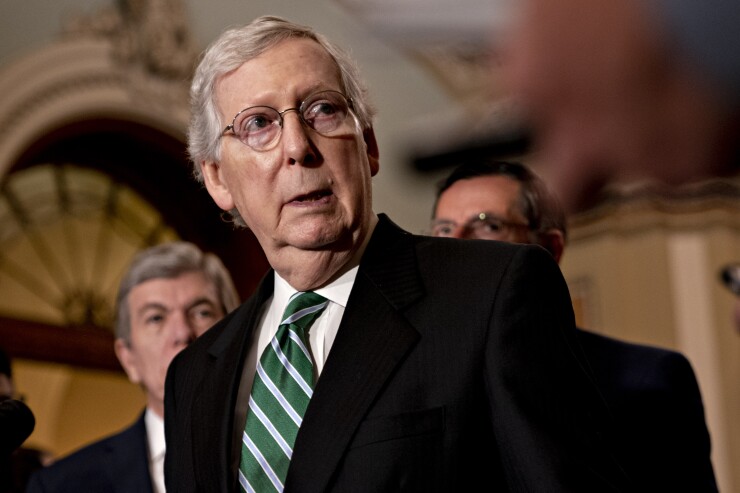The U.S. Treasury Department is expected to reopen the window for trading in State and Local Government Securities after President Trump signs a two-year budget deal that also lifts the nation’s debt ceiling.
The Senate approved the agreement 67-28 Thursday, a week after House passage in a 284-149 vote.
Trump repeated his support for the agreement in a
“Budget Deal is phenomenal for our Great Military, our Vets, and Jobs, Jobs, Jobs!’ Trump tweeted. “Two year deal gets us past the Election. Go for it Republicans, there is always plenty of time to CUT!”
The Senate vote came as upper chamber began its traditional August recess a week after the House did, which leaves the two chambers with just over three weeks after they reconvene two reach agreement on a dozen spending bills covering every federal agency prior to the Oct. 1 start of the 2020 fiscal year.
If they don’t reach agreement and a stopgap spending bill is needed for some federal agencies, the delays are likely to be relatively brief before state and local governments learn how much federal aid they will receive in the coming year.
John Hicks, executive director of the National Association of State Budget Officers (NASBO), said the deal approved by Congress “provides some certainty to states because it sets the top-line numbers for non-defense discretionary spending.”

“It gives states a better sense of the amounts that will be available,” Hicks said. “The budget deal is a good first step that will guide the appropriations process. Until the appropriation amounts are decided, the program-by-program impacts are unknown.”
Senate Majority Leader Mitch McConnell, R-Ky., described the agreement as “a strong deal.”
“First and foremost, it ensures our federal government will not approach any kind of debt crisis in the coming weeks or months,” McConnell said. “It secures our nation’s full faith and credit and ensures that Congress will not throw an unnecessary wrench into the gears of job growth and the thriving economy. What’s more, despite the desires of the Democratic House, the administration successfully kept far-left poison pills and policy riders entirely out of the process.”
Senate Minority Leader Chuck Schumer, D-N.Y., said, “This deal ends the threat of sequester permanently. That is huge.”
However, Schumer did not mention that it only ends the across-the-board cuts to discretionary spending and not for mandatory spending programs such as the federal tax subsidies for Build America Bonds. Those sequester cuts are extended through 2029.
Federal subsidy payments made to issuers of Build America Bonds and other direct-pay bonds have been cut by 6.2% in fiscal 2019 under sequestration, shaving 2.17 percentage points off the 35% federal subsidy. The subsidy for the current fiscal year, as a result, is 32.83%.
On the discretionary spending side, Schumer noted that the deal “increases domestic budget authority $10 billion more than defense. In the three years of Trump’s presidency and a Republican Senate, Democrats have secured over $100 billion in increases for domestic programs.”
Those new spending levels should help with efforts to pass a reauthorization of the Highway Trust Fund and other transportation-related infrastructure spending increases.
Earlier this week the Senate Environment and Public Works Committee unanimously approved a 27% spending increase in a five-year reauthorization of the Highway Trust Fund and other surface transportation programs after Sept. 30, 2020.
Sen. Ben Cardin, D-Md., said the budget deal “provides a reasonable growth rate for discretionary spending.”
“We have tremendous unmet needs in transportation infrastructure in this country,” Cardin said. “These caps give us a better opportunity for meeting those types of needs.”
Cardin said the city of Bowie in his home state doesn’t have the capacity to make the water ratepayers to pay for the new pipes that are needed for drinking water. The mayor there “needs the federal partnership of State Revolving Funds or other areas to help fund a modern water infrastructure so we have safe drinking water in our community.”
Among the 27 senators who voted against the budget deal were a bipartisan group of four former governors who objected to the projected increases in deficit spending.
“We were responsible for setting a budget each year that was fiscally responsible to fund our priorities,” said Republicans Rick Scott of Florida and Mitt Romney of Utah, former governor of Massachusetts, along with Democrats Tom Carper of Delaware and Joe Manchin of West Virginia.
“That’s why today, we, as U.S. Senators, cannot bring ourselves to vote for this budget deal that does not put our country on a fiscally sustainable path,” the four former governors said. “We cannot continue to ignore the fact that our country’s $22 trillion national debt is dangerous and unsustainable. We did not run our states this way, and it’s why, now as U.S. senators, we feel strongly that we must lead by example and say that this is not the way to run our country either.”
Sen. John Cornyn, R-Texas, also referred to deficit spending in a floor speech explaining his support for the deal immediately after the vote.
“We are avoiding the possibility of a government shutdown again this fall,” Cornyn said. “Instead it provides us the time and space for wide-ranging debate about our government’s spending habits. As our national deficit continues to grow, that could not be more critical.”





